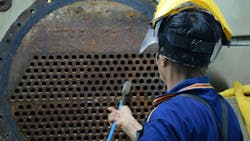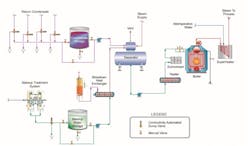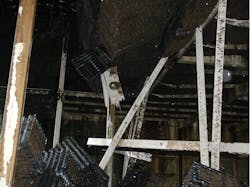Boiler and Heat Exchanger Failures: The True Cost of Poor Water Treatment
Several presenters at the University of Illinois Urbana-Champaign’s 2024 Electric Utility (and Co-Generation) Chemistry Workshop outlined how lack of trained personnel and corresponding poor operation of water-treatment systems have, over the decades, led to many boiler and heat exchanger failures.
Equipment repair, replacement and lost production can cost millions of dollars. And some failures have jeopardized employee safety. Yet, in today’s financial environment, where short-term profits often outweigh long-term benefits, companies continue to eliminate experienced staff and pinch pennies on infrastructure repairs.
Compounding the issue is the retirement of many Baby Boomers who are taking extensive experience with them when they leave.
Fortunately, proactively addressing issues related to water treatment and steam production can offer an enormously positive return on investment (ROI).
First Consideration, Makeup Issues
We will use the schematic shown in Figure 1 as a basis for the remaining discussion.
An integral component of steam-generating systems is the makeup water treatment unit. Many plants have sodium softening, sometimes with downstream dealkalization, for low-pressure boilers (<600 psig). A common arrangement for high-pressure units, such as combined-cycle power plants, is micro (or ultra) filtration, reverse osmosis (RO) and ion-exchange polishing. Regardless of boiler size and complexity, a primary requirement is minimizing hardness ingress, which otherwise would readily form deposits in boiler tubes and heat exchangers.
Deposits, in turn, lead to tube overheating and failures.
Yet, as I have directly observed along with numerous colleagues, the focus at many industrial plants is on process chemistry and engineering, with makeup water, condensate return, steam generation (and cooling water) treatment given lesser attention. This results in boiler tube failures. These issues can frequently be attributed to subpar training programs and a lack of knowledgeable personnel.
Compounding the problem in the last decade are the many retirements of seasoned personnel who take their institutional knowledge with them, leaving young, inexperienced people to handle what may, at times, be very complex issues. (3, 4)
Extreme cases have been documented in which, during a makeup treatment system failure, plant management has ordered operators to bypass the makeup system and feed raw water directly to the boilers. I have seen severe corrosion and subsequent boiler tube failures occur from cooling water in-leakage at steam surface condensers. The impurity ingress was much less than that which would occur by bypassing a makeup treatment system.
As a sidenote for forward-thinking plant personnel, even a well-operated and maintained softener still only removes calcium and hardness. A downstream degasifier or dealkalizer will reduce bicarbonate alkalinity, but the other ions in the makeup remain and then enter the boiler.
These impurities include chloride, sulfate and silica. A substitute for sodium softening that can remove 99% of all ions is reverse osmosis (RO). RO should be a strong consideration for makeup treatment of lower-pressure boilers. However, RO units require proper pretreatment to prevent ingress of impurities, such as suspended solids, and they require trained operators to regularly evaluate performance, ensure consistent chemical feed for scale and corrosion control and to perform membrane cleanings when instrument readings indicate that cleanings are necessary.
Irreversible membrane fouling can occur very quickly without proper attention. Also, because the RO effluent (known as permeate) has very few ions, it is considered by some to be “hungry water” that can attack steel. pH-conditioning is important to mitigate these effects.
Don’t Overlook Condensate Return Issues
The water/steam path for fossil-fired power boilers is usually straightforward. Steam produced in the boiler and superheater/reheater drives a turbine to generate electricity. The turbine exhaust steam is condensed in a water-cooled (or perhaps air-cooled) condenser, with the condensate returning directly to the boiler. The condensate and steam typically remain pure unless a condenser-cooling water leak, or, more rarely, a makeup water system upset, introduces contaminants.
The situation is often quite different at cogeneration and large industrial plants, where condensate may come from a variety of heat exchangers and processes. Impurities can potentially include inorganic ions, suspended solids, acids and alkalis and organic compounds. Consider the following case history.
Case History #1
A number of years ago, I visited an organic chemicals plant that had four 550-psig package boilers with superheaters. The steam provided energy to multiple plant heat exchangers, with recovery of most of the condensate. Each of the boiler superheaters failed, on average, every 1.5–2 years from internal deposition and subsequent overheating of the tubes. Inspection of an extracted superheater tube bundle revealed deposits of approximately ⅛–¼ inch in depth. Additional inspection revealed foam issuing from the saturated steam sample line of every boiler. The cause of the foam formation became quickly apparent. Water/steam chemistry analyses performed by an outside vendor included data showing total organic carbon (TOC) concentrations of up to 200 mg/L in the condensate return. Contrast that with the <0.5 mg/L feedwater TOC recommendation in Reference 5.
No treatment processes or condensate polishing systems were in place to remove these organics (five phenol derivatives) upstream of the boilers. Potential solutions, while not cheap, would most likely have been much less expensive than the regular superheater replacements. Possibilities included:
- Condensate dumping. This scenario would have required installation of a larger makeup water production system and possibly an upgrade to the plant wastewater treatment system.
- Retrofit of activated carbon filtration (ACF) polishing units to the condensate return may or may not have been viable, per issues related to molecular characteristics of the impurities and reaction kinetics. Regardless, laboratory and perhaps pilot testing were warranted to evaluate this technology.
- Resins, similar to ion exchange resins but without the active sites, that can adsorb organic compounds have been developed for specialty applications. Again, laboratory and pilot testing would have been warranted.
However, it became clear that plant management was looking for a “silver bullet” approach to solve the issue at very low cost. In the real world such solutions are rare.
Case History #2
This application was on an 800-MW supercritical power boiler. Standard operating procedure following each annual maintenance outage was filtration of loose iron oxide particles and other particulates with the unit’s deep-bed condensate polishers prior to unit startup.
Supercritical units require effective filtration to prevent particulate buildup and overheating of boiler tubes. The established method of using polisher resin for filtration proved problematic. This approach not only led to resin contamination but also significantly delayed boiler startup, typically requiring three to four days.
Each day offline cost the company up to $500,000 in lost revenue. Along with my colleagues, I persuaded management to purchase and install a mechanical filter with fabric membranes upstream of the polishers for approximately $100,000. In the very first use, the filter reduced startup time from four days to one, which represented an immediate ROI by a factor of four.
On a separate project for this particular steam generator, which relates to makeup water treatment, plant management approved the replacement of an aging clarifier/sand filter with a microfilter to improve suspended solids removal ahead of a downstream RO unit. The results were immediate and dramatic, with a calculated ROI of approximately three years. Reference 6 provides additional details.
Bottom Line: Water-Treatment Investments Pay Off
Many case histories are available that illustrate how reasonable investment in water-treatment equipment and personnel can pay for itself many times over in improved steam generation and heat exchanger reliability and efficiency.
But a company’s financial personnel may overlook these benefits in the quest for short-term profit gains. Another example of this involves cooling water. Cooling towers often sit in out-of-the-way locations and may not receive adequate attention until microbiological fouling, deposition or corrosion causes damage or failures. (7) A dramatic but not uncommon result is partial cooling tower collapse from deposit accumulation in cooling tower fill.
Apart from material and labor expenses for repair, lost production costs may be enormous.
To gain a better understanding of how these water treatment challenges impact industrial operations and to learn about effective solutions, consider attending future EUCCWs. The 2025 event, hosted by the University of Illinois, will take place June 16-18, 2025, in Champaign, Illinois. For more information on the event, visit https://publish.illinois.edu/electricutilitychemistryworkshop.
References
- Rziha, “The Loss of Know-How”; presentation at the 42nd Annual Electric Utility Chemistry Workshop, June 4-6, 2024, Champaign, Illinois.
- Water Essentials Handbook (Tech. Ed.: B. Buecker). ChemTreat, Inc., Glen Allen, VA, 2023. Currently being released in digital format at www.chemtreat.com.
- Buecker and E. Sylvester, “Foundational and Modern Concepts in Makeup Water Treatment”; pre-workshop seminar for the 42nd Annual Electric Utility Chemistry Workshop, June 4-6, 2024, Champaign, Illinois.
- Sylvester, “Makeup Water Treatment Processes – Ignore at Your Peril”; presentation at the 42nd Annual Electric Utility Chemistry Workshop, June 4-6, 2024, Champaign, Illinois.
- Consensus on Operating Practices for the Control of Feedwater and Boiler Water Chemistry in Modern Industrial Boilers, The American Society of Mechanical Engineers, New York, NY, 2021.
- Buecker, “Microfiltration: An Up and Coming Approach to Pre-Treatment for the Power Industry”; presentation at the 26th Annual Electric Utility Chemistry Workshop, May 9-11, 2006, Champaign, Illinois.
- Buecker (with substantial contribution by R. Post, cooling water expert, retired from ChemTreat), “Current Concepts in Cooling Water Chemistry”; pre-workshop seminar for the 41st Annual Electric Utility Chemistry Workshop, June 6-8, 2023, Champaign, Illinois.
About the Author
Brad Buecker
President, Buecker & Associates, LLC
Brad Buecker currently serves as senior technical consultant with SAMCO Technologies and is the owner of Buecker & Associates, LLC, which provides independent technical writing/marketing services. Buecker has many years of experience in or supporting the power industry, much of it in steam generation chemistry, water treatment, air quality control, and results engineering positions with City Water, Light & Power (Springfield, Illinois) and Kansas City Power & Light Company's (now Evergy) La Cygne, Kansas, station. His work also included 11 years with two engineering firms, Burns & McDonnell and Kiewit, and two years as acting water/wastewater supervisor at a chemical plant. Buecker has a B.S. in chemistry from Iowa State University with additional coursework in fluid mechanics, energy and materials balances, and advanced inorganic chemistry. He has authored or co-authored over 300 articles for various technical trade magazines, and he has written three books on power plant chemistry and air pollution control. He is a member of AMPP, ACS, AIChE, AIST, ASME, AWT, CTI, and he is active with Power-Gen International, the Electric Utility & Cogeneration Chemistry Workshop, and the International Water Conference.





